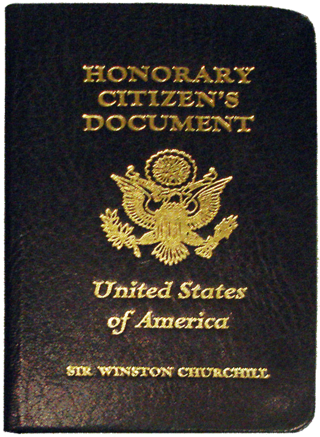Top Qs
Timeline
Chat
Perspective
Honorary citizen of the United States
U.S. title of honor From Wikipedia, the free encyclopedia
Remove ads
A person of exceptional merit who is not a United States citizen may be declared an honorary citizen of the United States by an Act of Congress or by a proclamation issued by the U.S. president, pursuant to authorization granted by the U.S. Congress.

Eight people have been so honored, six posthumously, and two, Sir Winston Churchill and Mother Teresa, during their lifetimes. For the Marquis de Lafayette and Mother Teresa, the honor was proclaimed directly by an Act of Congress. In the other cases, an Act of Congress was passed authorizing the President to grant honorary citizenship by proclamation. What rights and privileges honorary citizenship bestows, if any, are unclear. According to U.S. Department of State documents, it does not grant eligibility for U.S. passports.[1]
Despite widespread belief that Lafayette received honorary citizenship of the United States before Churchill,[2] he did not receive honorary citizenship until 2002. Lafayette did become a natural-born citizen during his lifetime. On December 28, 1784, the Maryland General Assembly passed a resolution stating that Lafayette and his male heirs "forever shall be...natural born Citizens" of that U.S. state.[3] This made him a natural-born citizen of the United States under the Articles of Confederation and as defined in Section 1 of Article Two of the United States Constitution.[4][5][2][6][7][8]
Lafayette boasted in 1792 that he had become an American citizen before the French Revolution created the concept of French citizenship.[9] In 1803, President Thomas Jefferson wrote that he would have offered to make Lafayette Governor of Louisiana, had he been "on the spot".[10] In 1932, descendant René de Chambrun established his American citizenship based on the Maryland resolution,[11][12] although he was probably ineligible for the distinction, as the inherited citizenship was likely only intended for direct descendants who were heir to Lafayette's estate and title.[13] The Board of Immigration Appeals ruled in 1955 that "it is possible to argue" that Lafayette and living male heirs became American citizens when the U.S. Constitution became effective on March 4, 1789, but that heirs born later were not U.S. citizens.[5]
Honorary citizenship should not be confused with citizenship or permanent residency bestowed by a private bill. Private bills are, on rare occasions, used to provide relief to individuals, often in immigration cases, and are also passed by Congress and signed into law by the president. One such statute, granting Elián González U.S. citizenship, was suggested in 1999 but never enacted.[14]
Remove ads
Recipients
Remove ads
See also
Notes
References
External links
Wikiwand - on
Seamless Wikipedia browsing. On steroids.
Remove ads








